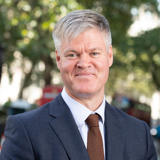There has long been a sense that the financial sector needs to provide much more funding to green projects and carbon-reducing technology. But in order for this to happen at required scale, the sector needs to be given stronger incentives. This discussion presented an opportunity to hear from leading financial institutions globally about practical early-stage financial solutions currently being trialed, the key barriers they perceive to exist, and policy priorities.
Professor David Aikman
14 December 2023
Financial sector experts join King's event at COP28
Experts from King’s hosted an event at COP28 in collaboration with the United Nations (UN), to examine the role of the financial services sector in the transition towards net zero emissions.

Representatives from leading financial services organisations around the world came together for the roundtable event in Dubai, to consider how the sector can mobilise funds to increase investment in new technologies and energy systems.
Chaired by Professor David Aikman, Director of the Qatar Centre for Global Banking & Finance at King’s Business School, the discussion aimed to join the dots between engineering innovation and finance.

Hosted in partnership with the UN Environment Programme Finance Initiative, and King's Net Zero Centre, as part of the ‘Sustainable Finance Forum’ series of events at COP28, the panel included:
- Dr Mukund Rajan, Chairperson, ECube Investment Advisors
- Amit Puri, Global Head, Sustainable Finance, Standard Chartered Bank
- Ommid Saberi, Global Program Lead - Green and Resilient Buildings, International Finance Corporation
- Luanne Sieh, Group Chief Sustainability Officer, CIMB Group.
Speakers shared a number of examples of where financial institutions have innovated in providing climate finance solutions, from loans with preferential interest rates for borrowers who meet their sustainability targets, to the role of “blended finance” (i.e. public-private cooperation) in mobilising capital.
The discussion also addressed the many barriers that prevent ideas and projects from being scaled up. Panel members advocated for a reduction in bank capital requirements for green projects and for a expanded role for carbon pricing and green taxonomies, particularly in emerging market economies.
Professor Gulcin Ozkan, Professor of Finance at King's Business School, was in the audience at the event. She said: “There appears to be no systematic definition of what makes an investment or project green (sustainable), especially in emerging economies.”
Professor Raúl Rosales, Strategic Engagement Lead at King's Net Zero Centre, added: "There is plenty of work to do connecting the dots between engineering energy systems' innovation and disruptive low-carbon technologies, with policymakers and investors.”
As a result of roundtable, Professor Aikman and his colleagues are now preparing a policy briefing note which will be published in the early new year, featuring a list of recommendations that could help develop the financial sector’s ecosystem for investing in climate adaptation.

